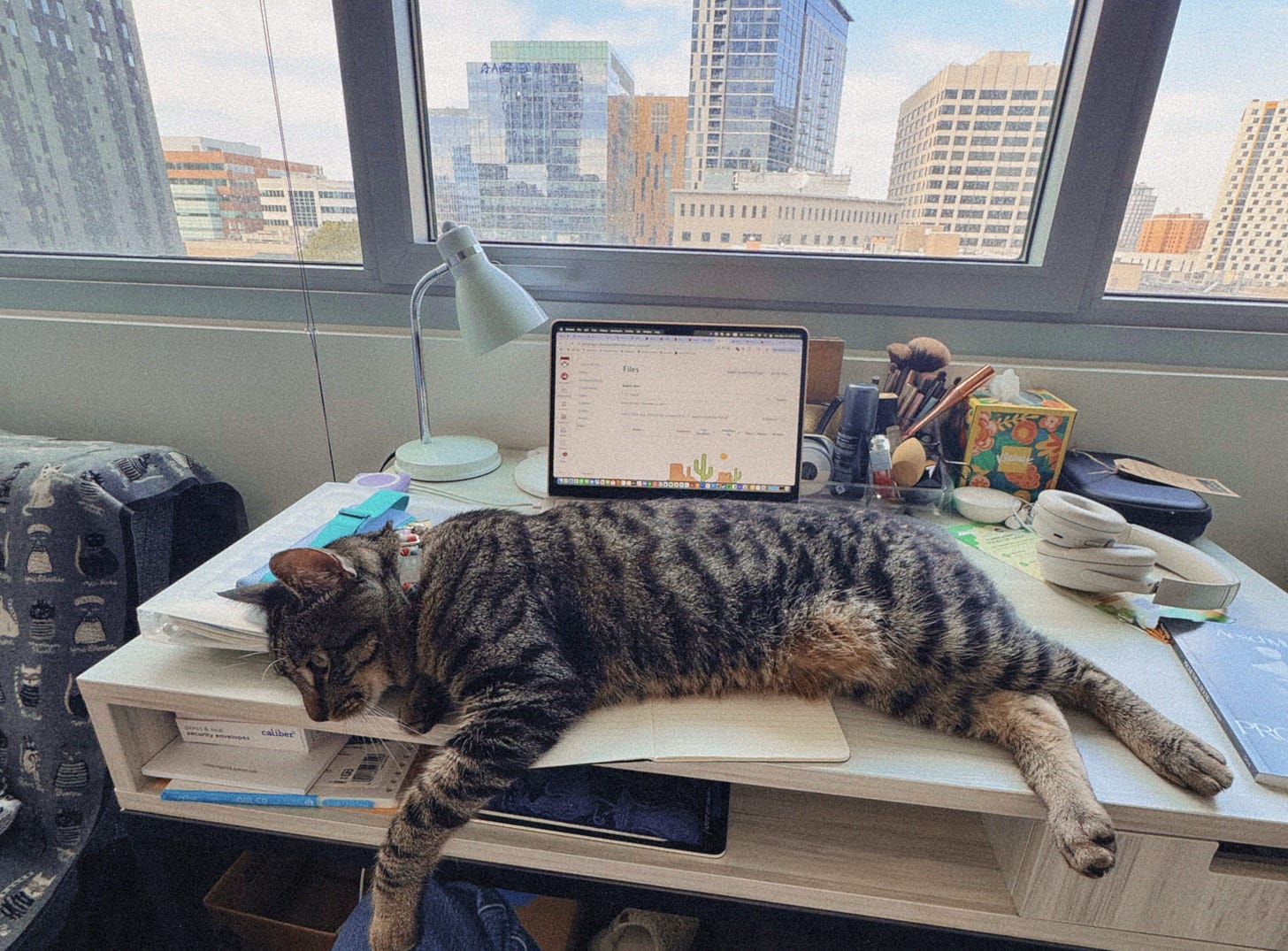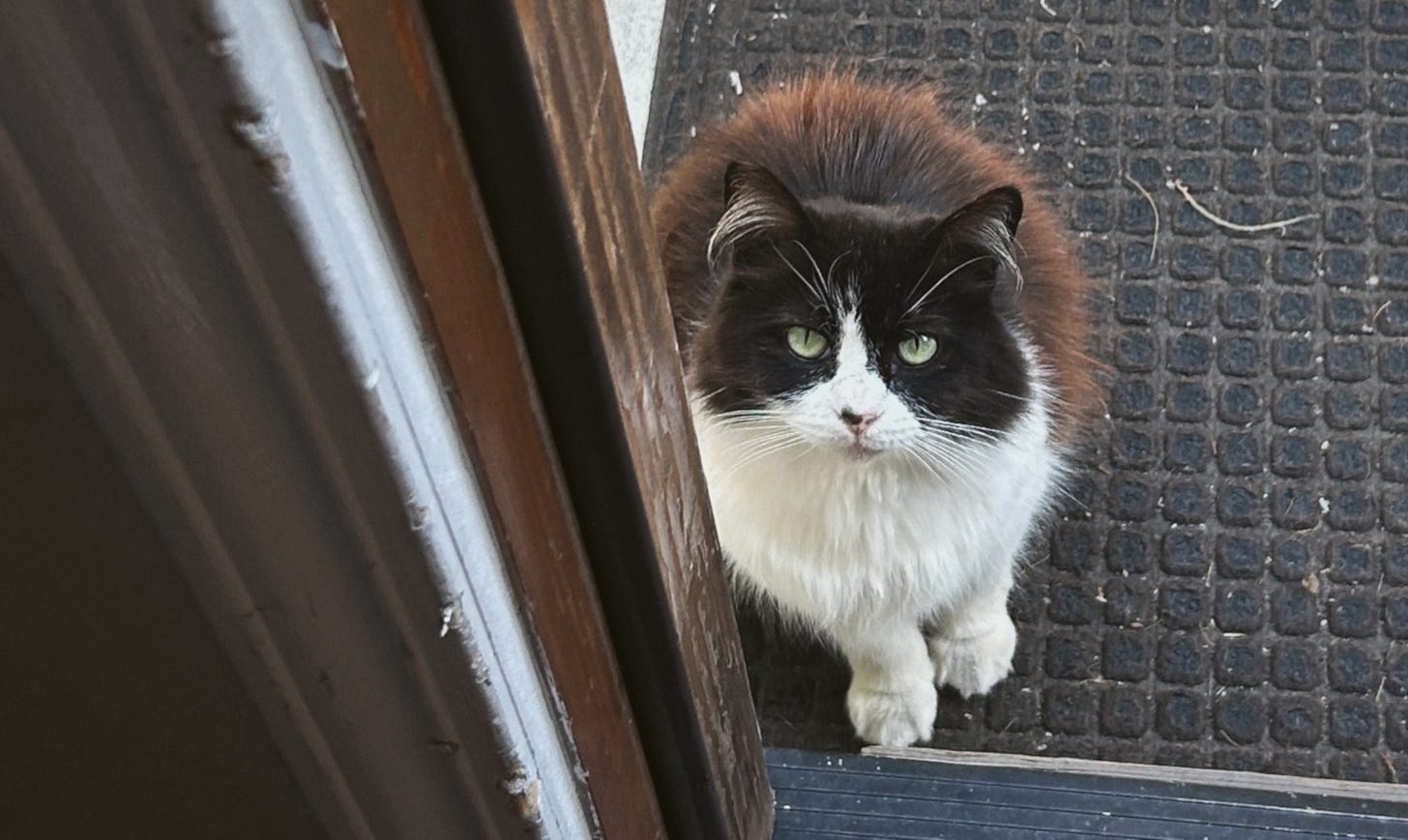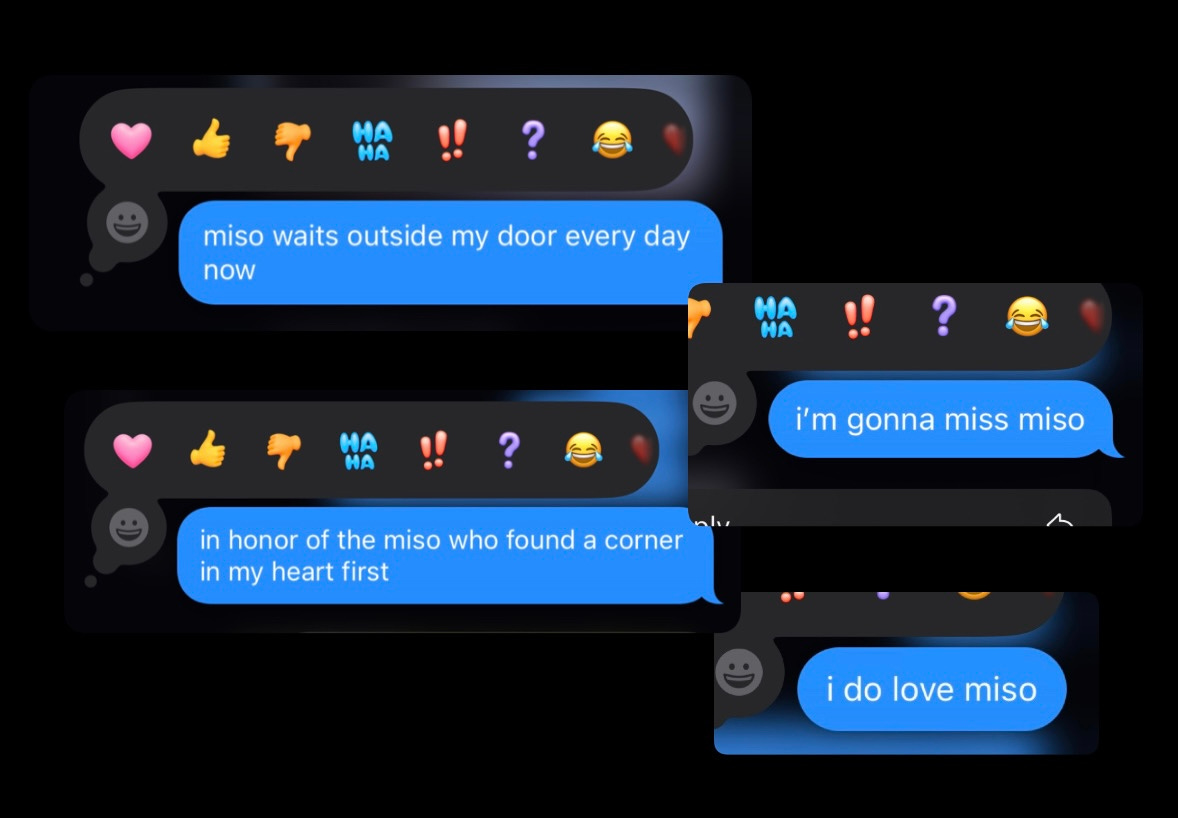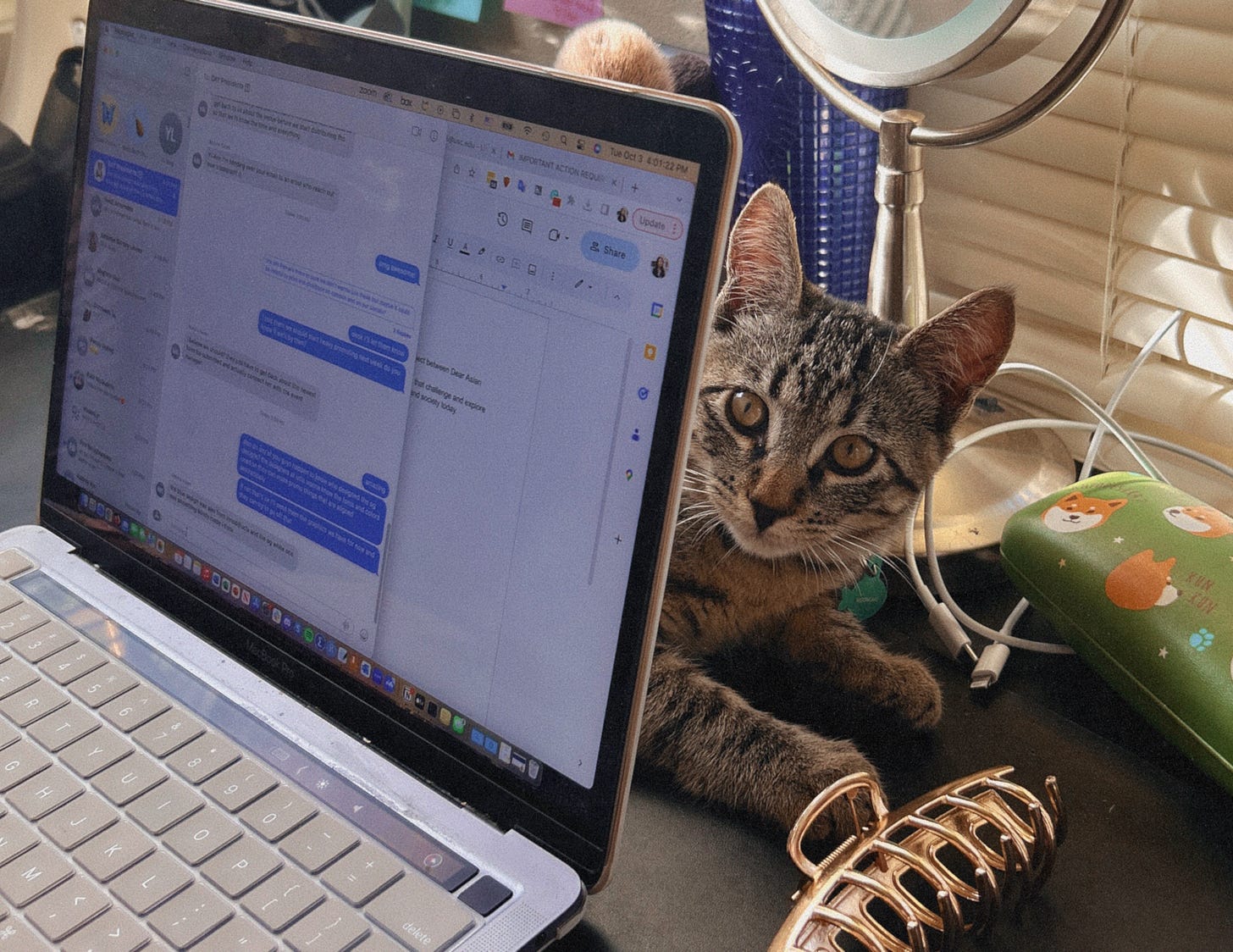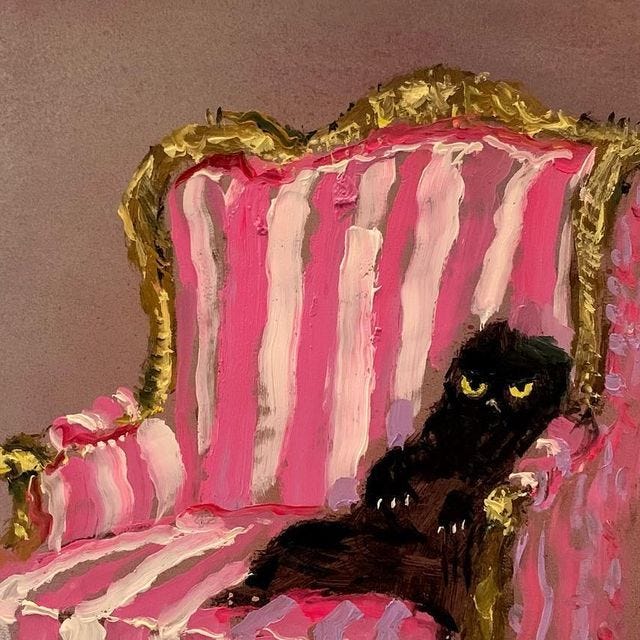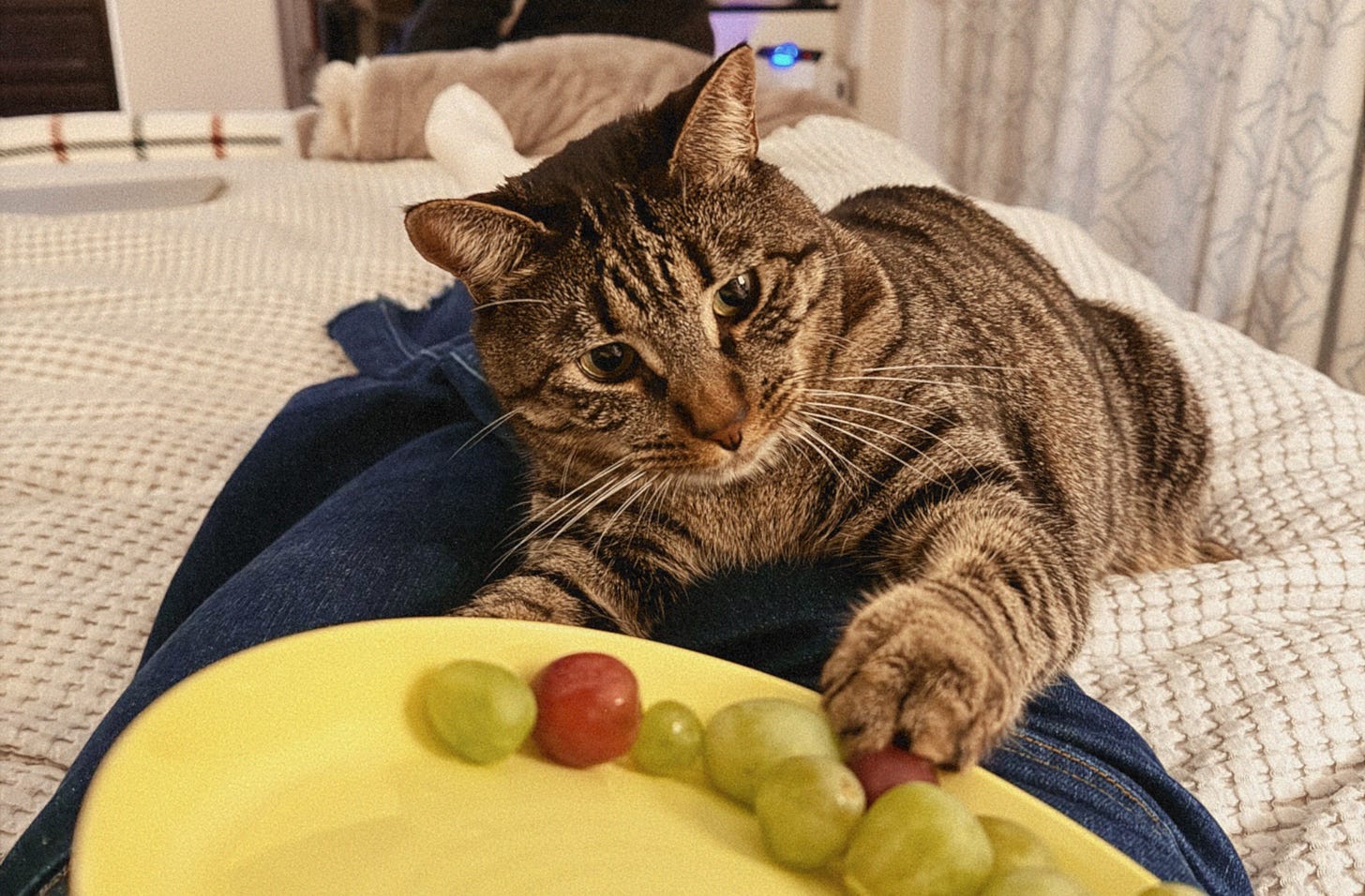postscripts #7: lessons i learned from cats
on the domestic habits of creatures with no fucks left to give
“Of all God's creatures, there is only one that cannot be made slave of the leash. That one is the cat. If man could be crossed with the cat it would improve the man, but it would deteriorate the cat.”
— Mark Twain
ruminations
Hello friends <3 After the cerebral trainwreck that was last week’s postscript, I promised to deliver some fluff this week. So deliver fluff I shall.
I adopted Mooncake (twelve pounds of tailless chonk and love) at the beginning of my senior year of college. I never thought I’d be a cat person; I begged my parents for a dog when I was ten years old (complete with a researched powerpoint presentation and argumentative essay) and spent my teenage years with a gentle yellow Labrador — and then later, a spunky, fiercely intelligent, equally anxious German Shepherd. I am ashamed to admit I fell for the anti-cat propaganda: that cats were aloof, invulnerable, impersonal. What changed things for me, though, wasn’t Mooncake. Before Mooncake, there was Miso.
I stayed in LA during the summer of my junior year, working as an editorial intern for an AAPI-focused media company and podcast. After signing my sublease papers, the tenant said she had one odd request: “There’s a stray cat on this street we call Miso. She wanders by the unit every day; every tenant who lives here feeds her. If you want to keep doing that, we’d really appreciate it, but you’re by no means obligated to.”
“No problem,” I’d responded. Even though I’d grown up with a strong allegiance for unconditional canine loyalty, I was an animal lover across the board (as in, the horse’s death in The Godfather was the most despicable part of the movie for me). I dropped by Target after moving my things in and used the first of my summer paychecks to buy a case of Fancy Feast canned cat food.
Miso came by that evening. She was a round, fluffy tuxedo with whiskers that reached toward heaven and a roundness that suggested she either was infested with parasites or more than well-fed by the other neighbors on the street. I cracked open a can of Fancy Feast; at the sound of the metallic scrape of the cover opening, she let out a delighted “mew” and scampered over. Hesitant at the new sight and smell of a stranger, she perched cautiously a few feet away from the open can. I found myself sitting down a few feet away, murmuring reassuring words about how utterly undangerous I am, how adorable she is, how the food is safe, how I hope she enjoys classic salmon paté. After a few minutes, her cautious eyes and paws found their way to the can — then, a few slow careful sniffs, licks, glances at me. When she was satisfied her food would not be stolen by this new inhabitant, she crouched and munched away happily.
I spent the rest of my summer accompanying Miso during her dinners. Slowly but surely, we built a mutual tolerance for each other, and then perhaps some affection. I came to look forward to the sound of her chirped greetings in the evenings, and felt something simultaneously burst and melt in my chest every time she purred, bunted, or rubbed herself against my ankles and hands. I entertained the thought of adopting her on multiple occasions, although financial and practical circumstances ultimately barred me from doing so. I realized by the end of that summer that cats are not invulnerable, impersonal, or aloof; they don’t inherently demand to be left alone. They are simply discerning with their attention and energy. Their trust is earned. They cannot be commanded. All things perhaps, I — a people-pleasing, socially anxious, overly accommodating, chronically under-confident individual — should aspire to.
One of my biggest regrets is not going back and finding Miso. My partner reminds me often — “you cannot save them all, my dear.” But out of all the stray cats and dogs out there, Miso haunts me the most. While it brings me some comfort to learn that the other neighbors on the street all also established legacies of current tenants feeding her, I cannot bring myself to imagine a reality in which she is not happily fed and free. (This ruminative anxiety is made worse by the fact that, later that year, my housemate and I will name another fellow stray that frequented our street Apollo, feed him for weeks and months only for him to disappear, then eventually find out he had been hit by a car one weekend when neither of us were home. Our neighbors were the ones to bring him to the vet and decide to put him down).
When an old friend of mine shared later that August that he had a litter of kittens who needed a home and that he was trying to keep out of a shelter, I didn’t hesitate to volunteer. A few weeks later, he drove down to Los Angeles, and I walked home with a small bundle of tailless, brown tabby.
In some ways, I like to think Mooncake — and cats — saved my life. Coming out of one of my most emotionally volatile and worst years of college, armed with boatloads of depression and PTSD and an amount of spite that could not have been healthy for any twenty-one-year-old woman, I found a soul that demanded from me not bitterness or vindication, but gentility and acceptance. (Nor did I ever feel the urge to spiral — not when all that energy when into loving and nurturing a living being instead).
Things I learned from the cats that have been in my life:
Be curious, but not careless.
If you’ve had a bad day, clean yourself up and try again tomorrow. Preferably not by licking yourself all over — a shower would do.
Never underestimate the power of a good stare. To bring people in, or drive them away.
A good stretch can solve many things.
So can a nap. In the sun, if possible.
Adequate sleep is nonnegotiable.
Ask for what you want. Meow loudly. Knock things over if necessary. The squeaky wheel gets the grease, and all that.
You do not have to like everyone. Conversely, not everyone needs to like you (or should).
“No,” is a complete sentence. If that fails, hissing works, too.
Nine lives or one, protect what you cherish — your time, your energy, your people. And love them even more.
Yours in writing,
Cherie
in rotation
“Fable” Gigi Perez
Something about this song transports me to endless fields of dying poppies, an endless night sky, the rooftop of an old abandoned castle as the sun dips below the horizon at dusk, standing in the sand dunes feeling infinitesimally irrelevant, manically filling pages and pages of writing fueled by the utter fear that you will forever be forgotten in history, an atheist finding God and a Christian losing faith.
“Here” comic by Richard McGuire:
I’ve never been a comics or graphic novel girl, but since I’m taking a seminar on it this semester, I’ve found myself more and more drawn to the vast arsenal of messaging the comic form can accomplish that plain text literature cannot. It’s an exercise in stretching my brain in a way I have never had to before, and is so, so fun. This particular comic was assigned reading for a class and quite literally changed my life. It first appeared as a 6-page comic in 1989, and was later expanded into a 300-page graphic novel. In just six pages, McGuire exposes the viewer to a single spot — literally a single spot, a corner of a house — through eons (yes, eons) of time. While the illustration is simple, by employing insets of panels (mini panels inside various panels, each representing a different year and highlighting a different detail in location of interest) in just a few minutes McGuire manages to bend, stretch, and duplicate snippets of time in a way that will make you feel both incredibly small and expansive. It’s worth multiple reads — each time, you’ll catch something new. Whether it’s catching silly ways McGuire bridges dialogue from across decades in a formally ironic way, or connecting visual details to each other, it’s both an exercise in existentialism and a fun puzzle to pass the time.
I’m attaching the 6-page comic here because I want everyone to read it that bad. I encourage you to also check out the graphic novel. It has also been adapted into other media forms (remediated on Youtube, film [2024])
tiny joys
Personality stickers on laptops and water bottles, peanut butter crackers, Mary Janes, used books, free departmental coffee
loose threads
Does Miso think about me? Do cats grieve memory?
The dying romance of the library catalog card
Fighting with your cat over your annotating pen. But it’s my fault in the end because apparently it was dinnertime.
The high-stakes drama of choosing which Spotify playlist for a two-block walk
Trying to figure out if you’re tired or just alive in late capitalism
The joy that is writing a handwritten letter
See you next week <3
Cherie



